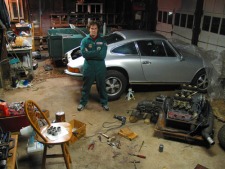261 Broad Street
Windsor, CT 06095
(860) 285-0172
support@invisiblegold.com
Your Website Should Be Easy to Edit
Windsor, CT 06095
(860) 285-0172
support@invisiblegold.com
Your Website Should Be Easy to Edit
Zen and the Art of Website (Technology) Maintenance
REASON FOR THIS ARTICLE
In the book, Robert talks about his riding partners that have largely given up on trying to understand "technical" things. They ride an expensive new motorcycle known for its reliability, but are at the mercy of chance. A flooded engine or simply riding fast on a hot day can leave them stranded. 40 years ago, a motorcycle was a relatively simple machine. Things are more complicated and change faster today. You need a computer to work on your car, an expert to tune up your computer, and a hacker to make your digital camera work. AND, all three of these will be "obsolete" two summers from now. Old rules don't apply so we're at risk of getting stranded. | ||||||
DON'T GIVE UP
If you've done any shopping recently you know how easy it is to get discouraged. Take a deep breath. Things aren't "really" that different. A fancy new computer won't check email any better. An old motorcycle will still get you to California, and we all know someone without an email account. What we really need are guidelines for dealing with technology and the courage to look at things objectively. | ||||||
GUIDELINE 1: FIND A COMFORTABLE PACE
Accept the fact that whatever you have will be out of date next year. Soon, we'll all "need" cars with GPS navigation and Internet connections. Will they get us there any faster? Maybe. Does it matter? No. Cars change every year with new models. We all can accept the pace because it's subtle. Remember when fuel injection came out? Not much changed. On the other hand, computers are different. Remember when broadband came out? It's like a different Internet. The same thing will happen with just about everything: digital cameras, cell phones, credit cards, etc. If cars advance as quickly as computers, next fall you'll be driving 150 miles per hour. You can either scramble to stay with the pack, or enjoy the ride on interesting side roads. | ||||||
GUIDELINE 2: PLAN FOR REGULAR MAINTENANCE
However, there seem to be two schools of thought these days. Some people make a major purchase every few years and throw out the old. Others make more frequent smaller purchases - last year's computer, a simple website freshen up, etc. It's easy to figure out how you are: How old is the car you drive? How old is the computer on your desk? The simple fact is that you need to maintain the equipment you depend on. A computer catches viruses, a car needs oil changes. These aren't the big purchases...these are the ones that keep things running smoothly. Yes, it costs money, but it's silly to replace a computer just because the drive is full of spyware. | ||||||
GUIDELINE 3: SEEK OUT EXPERTS AND MENTORS
Computers and modern technology are more specialized than things in the past. I used to be able to work on my own car. Recently it took three mechanics (one was myself) to solve an overheating problem. In the end, the dealer simply hooked up to a computer and flashed the bios. Yup, that's right, they simply updated the software and it fixed the problem. It cost $700, but would've taken longer and more money for me to become an expert and buy the equipment. In the modern age, we need to seek out the people that invest the time and money to become specialists. It also points out that with the pace of change, products aren’t always “done” when they leave the factory. |
COROLLARY: EVEN WITH EXPERTS, IT'S UP TO US TO DRIVEOn the other hand, this doesn't mean that we can simply give up. It's up to us to pay attention to the warning lights, operate our equipment in an intelligent manner, and not get stuck. You either have enough money to hire a professional driver or enough to hire someone to fix it when it needs attention.We all know the story of a new driver that doesn't realize cars need oil. The same thing is true about computers and websites. |
GUIDELINE 4: SEEK QUALITY AND PLAN FOR RELIABILITY
"The network IS the computer" - Sun Microsystems Finally, we need to build in reliability into our systems. Just as technology needs regular maintenance, it also fails regularly. It's great to have a digital camera - but keep in mind that your photos may be sitting on a hard drive that will fail sometime in the next 5 years. Do you have a backup plan in place? The easiest thing to do is build up a network of “good quality but not the latest" computers and technology in your life. Plan them to work together and simply add and remove capacity as they get too slow or you need desk space. This sort of approach allows us to avoid expensive equipment (redundant drives), and use smaller cheaper equipment that can be replaced and swapped out as technology changes. | ||||||
| ||||||
| John Waiveris writes about technology and small business marketing for Invisible Gold, LLC. For more information call (860) 285-0172 or visit www.invisiblegold.com "You Website Should Be Easy to Edit"
| ||||||









